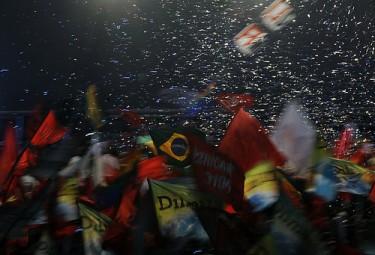Dilma Rousseff, a former Marxist guerrilla who was imprisoned and tortured during Brazil's military dictatorship, has become the country's first female leader [pt], winning 56% of the total votes compared to rival Jose Serra's 44%.
62-year-old Rousseff, the protegee of current leader, Lula, has vowed to follow in her predecessor's footsteps by eradicating extreme poverty in Brazil [pt], one of the world's most unequal countries. Calling on the nation at a victory rally in the Brazilian capital, Brasilia, Rousseff said,
We cannot rest while Brazilians are going hungry, while families are living in the streets, while poor children are abandoned to their own fates and while crack and crack dens rule.
She heralded her win as a demonstration of democratic progress in Brazil, adding [pt],
Eu gostaria muito que os pais e as mães das meninas pudessem olhar hoje nos olhos delas, e dizer, “sim, a mulher pode.”
I want fathers and mothers to be able to see today through their daughters’ eyes, and say, “yes, a woman can.”
Voting maps [pt] showed a clear divide between north and south. Dilma won a landslide victory in Brazil's impoverished northeast, as well as in much of the Amazon region, while Serra's gains in his home state of São Paulo were strong.

Dilma Rousseff at her victory speech in the Brazilian capital, Brasilia. Image from Rede Brasil Atual's Flickr photostream. Used under a Creative Commons license.
Brazil's blogosphere exploded with elation at the news. Political blogger Eduardo Guimãraes wrote a brief entry on Blog da Cidadania [pt]:
Não devo escrever muito. O momento é de os democratas comemorarem a vitoria da verdade sobre a mentira, da democracia sobre os vassalos da ditadura militar que ameaçaram retomar o poder por meio de um homem sem caráter, capaz de tudo para atingir objetivos pessoais.
Haverá muito, muito tempo para analisar o novo Brasil que não pára de surgir no horizonte. Agora é hora de comemorar. Comemore, pois. Escreva aqui o que quiser. O blog é seu. Você merece por ajudar este espaço a travar o bom combate com seu apoio, com sua leitura, sua repercussão.
Viva Lula!
Viva Dilma!
Viva a Democracia!
Viva a verdade!
Viva o Brasil!
I don't need to write much. The moment is for the democrats to celebrate the victory of truth over lies, of democracy over vassals of a military dictatorship that threatened to return power to a man without character, capable of anything in order to achieve personal objectives.
There will be a lot of time to analyse the new Brazil that is looming on the horizon. Today is the time to celebrate. Celebrate, then. Write here what you wish. The blog is yours. You deserve it for helping this space to catch the good fight with your support, your readership, your repercussions.
Long live Lula!
Long live Dilma!
Long live democracy!
Long live truth!
Long live Brazil!
Escrevinhador's Rodrigo Vianna [pt] added that Dilma's victory has been a long time coming, and will allow the government to continue Lula's gains in widening social inclusion, creating welfare programmes, reducing poverty, strengthening regional and international diplomatic ties, and extending partnerships with social movements and unions. Slamming the campaign tactics employed by Brazil's right wing, Vianna added [pt] that Dilma's victory symbolised the defeat of preconceptions and hate. He writes,
Dilma significa a vitória de um projeto generoso, e o enterro de uma determinada oposição.
Dilma signifies the victory of a generous project, and the burial of a determined opposition.
Left-wing portal Vermelho [pt] also listed a number of other ‘losers’, including Brazil's highly concentrated mainstream media, whose monopolisation over electoral news was challenged by bloggers and citizen-led initiatives [pt], such as 48 Horas Democracia [pt], which provided live alternative coverage of the elections. What ensued throughout the presidential campaigns was nothing short of a politically-aligned media war:
Os meios de comunicação monopolizados por um minúsculo grupo de famílias capitalistas (Marinho, Civita, Frias e Mesquita) estão entre os grandes derrotados deste pleito. Com o destaque das Organizações Globo e da editora Abril, que transformou a revista Veja num mal disfarçado panfleto da campanha tucana, a mídia escancarou o apoio ao candidato da direita e em certo momento passou a ditar a agenda da campanha. Deixou cair a máscara do pluralismo e da imparcialidade. A verdade saiu arranhada nesta mídia. Apesar do segundo turno, o povo não se deixou enganar e impôs nova derrota à mídia…Tudo isto deve servir de lição ao novo governo, que pode pautar um debate mais sério e sereno sobre as propostas da Primeira Conferência Nacional da Comunicação (Confecon).
The means of communication monopolised by a miniscule group of capitalist families (Marinho, Civita, Frias and Mesquita) are among biggest losers of this election. With the prominence of Globo and Abril, which transformed Veja magazine into a poorly disguised veil of the toucan's campaign (a term for the opposition party, PSDB), the media opened wide the support for a candidate of the right and in a certain moment began to dictate the agenda of the campaign. They left the mask of pluralism and impartiality. The truth came out scratched in the media. Despite the runoff, the people were not deceived and imposed a new defeat of the media…All this serves as a lesson to the new government, that can guide a more serious and serene debate of the proposals of the first National Conference on Communication (Confecom).
Embracing more alternative means of communication (as the Confecom proposed) and continuing the democratisation of Brazil's media system, Vianna says [pt], will remain one of Dilma's key challenges. Others believe [pt] she will struggle to set herself free from the shadow of her predecessor and mentor, Lula. Politics and electoral blogger Alexandre Campbell [pt] writes,
Em 2003, Lula sucedeu um adversário que deixou o cargo com os índices de popularidade aos frangalhos. Por isso, a comparação de Lula com os tempos de FHC foi sempre benéfica ao atual presidente.
Dilma, ao contrário, sucederá um aliado, que deixou o cargo com alta popularidade. Não poderá culpar Lula pelos problemas que vier a encontrar e, ao mesmo tempo, não adiantará apenas dar continuidade aos seus avanços.
In 2003, Lula succeeded an adversary who left office with popularity ratings ripped to shreds. For this, the comparison between Lula and the times of FHC [Fernando Henrique Cardoso] were always beneficial to the current president.
Dilma, however, will succeed an ally, who left office with high popularity. She will not be able to blame Lula for the problems she will encounter and, at the same time, it will not be enough to only continue his successes.

Supporters celebrate Dilma's victory. Photo by Marcello Casal Jr/ABr, from Jornal Correio Regional's Flickr photostream. Used under a Creative Commons license.
Meanwhile, the question of what having a woman in power will mean for Brazil has inevitably been raised [pt]. Dilma rarely marketed herself explicitly as a female president, instead prioritising poverty reduction over gender issues. But women's groups applauded [pt] her win as a huge success in a country in which females are often excluded from decision-making, and hoped it would boost the creation of public policies for women.
Last week, veteran women's rights activist Rachel Moreno also mulled over the topic [pt], inviting feminists to look beyond the debate on decriminalising abortion that marred the presidential runoff. Dilma believes, Moreno says,
Na ampliação do espaço e atendimento das reivindicações dos negros; na inclusão social através da política de estímulo ao consumo e criação de empregos; na Bolsa Família, na realização de Conferências da Mulher e na inclusão de nossas reivindicações nas políticas de governo.
In the amplification of the space and meeting of the demands of black people; in the social inclusion through the policy of stimulating consumption and job creation; in the Bolsa Familia [a family welfare programme], in the realisation of Conferences on Women and in the inclusion of our claims in government policies.
But, Moreno continues,
Hoje, temos ainda a reivindicar mais creches e escolas em período integral para as crianças, maior qualidade do ensino e mais funcionários nas escolas, com a devida valorização salarial e de formação dos professores. Temos a reivindicar a equiparação salarial das mulheres; o acesso maior e a efetiva equidade no mercado de trabalho; a Reforma Política que nos dê condições de igualdade, uma imagem respeitosa, diversa e plural na mídia; etc. etc. etc.
Today, we are still yet to claim more full-time creches and schools for children, higher-quality teaching and more staff in schools, with the due appreciation in salaries and training of teachers. We are yet to claim equal pay for women; better access and equity in the labour market; political reform that gives us an equal playing field, a respectful image, diverse and plural media; etc. etc. etc.
Maíra Kubík Mano, writing at feminist blog Viva Mulher [pt], also stressed the symbolic importance of a woman leading the country given the low participation of women in Brazilian national politics. However, also referring to the ugly nature of the recent abortion debate, she reminded us that “Dilma is not synonymous with having a government that supports feminist agendas”:
Na verdade, se pensarmos no quão conservador se tornou o debate em torno dessa questão [o aborto], não seria exagero dizer que o cenário piorou para as pautas historicamente ligadas ao feminismo. E, para além de ações isoladas, principalmente da Secretaria de Políticas para as Mulheres, o governo Dilma dificilmente contribuirá para reverter isso.
Much in line with Dilma's own approach, Vianna writes [pt],
É importante eleger uma mulher – sim! Importantíssimo, e nos próximos dias poderemos avaliar isso melhor. Mas Dilma não é simplesmente “mulher”. É uma brasileira que ousou lutar contra a ditadura, em organizações clandestinas. Isso a velha elite não perdoa. É uma marca tão forte quanto os quatro dedos do operário que nunca será aceito na velha turma.
Yes, it's important to elect a woman! Very important, and in the next few days we can assess this better. But Dilma is not simply a “woman.” She is a Brazilian that dared to fight against the dictatorship in clandestine organisations. The old elite does not forget that. She is a brand as strong as the four fingers of the worker that will never be accepted in the old gang.
Building on Lula's progress, Dilma Rousseff certainly symbolises a new era for a country whose growth rates make the West envious. The challenges that lie ahead of her are not small: she has pledged to move 20 million Brazilians out of poverty, while the country remains besieged by drastic crime rates, to name but a few. But with the majority of this South American giant behind her, the future looks bright.
This post was proofread by Diego Casaes.







2 comments